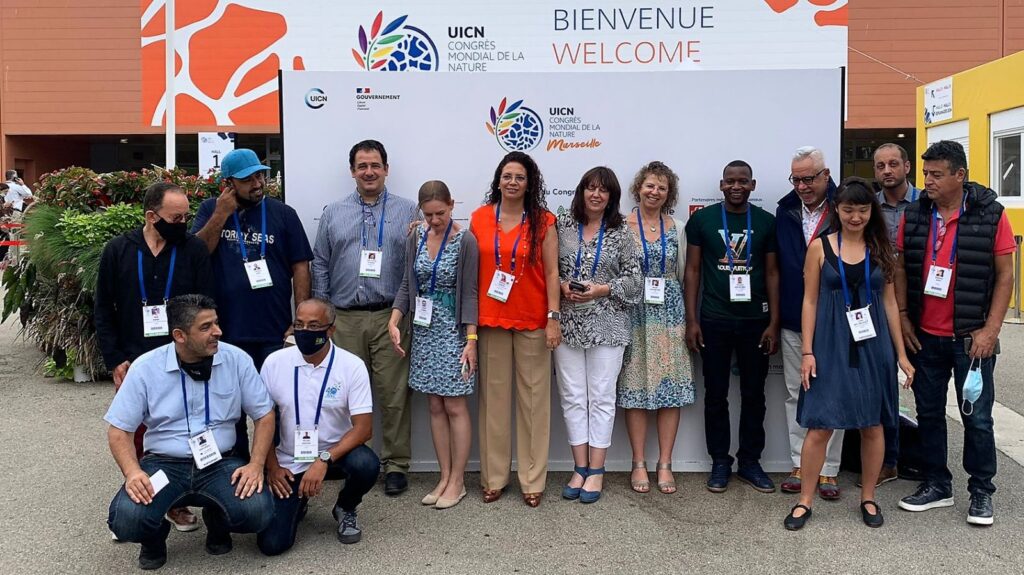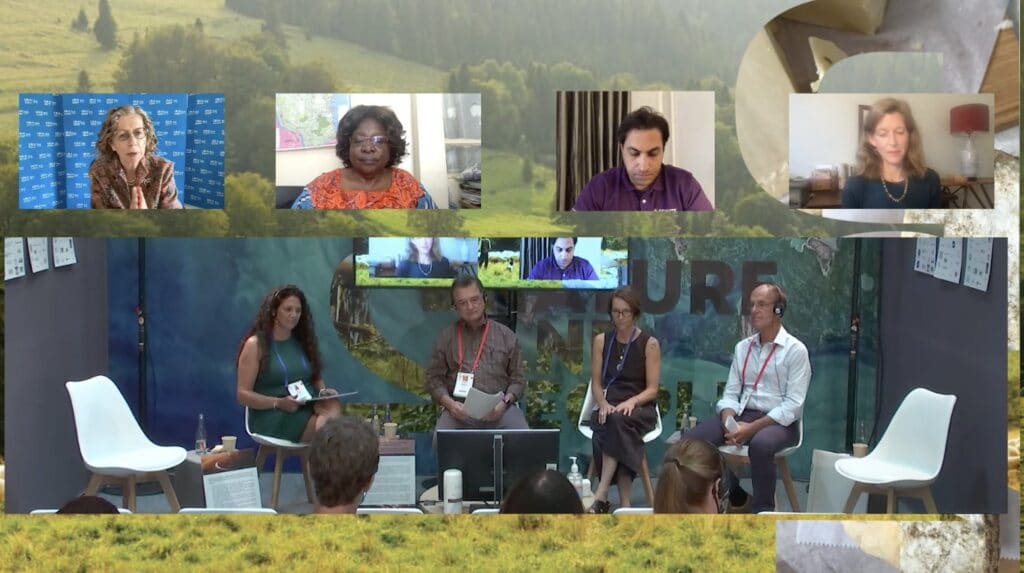BirdLife at the IUCN World Conservation Congress

Despite the ongoing COVID pandemic, amid the escalating climate and biodiversity emergencies, BirdLife CEO Patricia Zurita led a small policy delegation to the just-closed International Union for the Conservation of Nature (IUCN) World Conservation Congress in Marseille.
By Melanie Heath, Director of Science, Policy & Information
Despite the ongoing COVID pandemic, amid the escalating climate and biodiversity emergencies, BirdLife CEO Patricia Zurita led a small policy delegation to the just-closed International Union for the Conservation of Nature (IUCN) World Conservation Congress in Marseille.
As Global Director of Science & Policy, I joined Patricia and Head of Policy Noelle Kumpel, with BirdLife Partners from France, the UK, Spain, Netherlands, Germany, Jordan, Lebanon, Tunisia, Morocco, Cabo Verde, Zimbabwe, Palau, and the Dominican Republic. We were all part of a throng of over 5000 in-person delegates. Other BirdLife Partners joined 3000 others online.
We were thrilled to help elect Razan Al Mubarak as President, the first woman from the Arab world to head the IUCN.
Our window of opportunity to respond to these interlinked emergencies and share planetary resources equitably is narrowing quickly – we heard repeatedly that ‘the time is now’ – and powerfully that ‘there is no vaccine for a sick planet’. Critical was the adoption by delegates from governments, the private sector, non-governmental organisations (NGOs), Indigenous Peoples’ Organisations and Community-Based Organisations of a motion on the need for a strong and ambitious global biodiversity framework that provides a clear, measurable, action-orientated roadmap to equitably halt and reverse biodiversity loss and secure a nature-positive world by 2030, to support all life on Earth now and for future generations.
Importantly, this was one of two key motions which called to work with local stakeholders to protect and conserve 30% of the planet by 2030, focusing on key areas for biodiversity. But at the same time, two emergency motions which were strongly supported by BirdLife Partners from around the world highlighted the threats to the Wadden Sea and Okavango World Heritage sites from oil and gas exploitation, calling for governments and businesses to uphold their commitments to safeguard. This underscores the critical need for high-level commitments to translate into real action on the ground, as well as to address climate change and link the biodiversity and climate agendas.
Patricia Zurita said “Humanity finds itself at a tipping point – and the global meetings happening over the coming months on biodiversity and climate must be seen as the turning point where we address these crises – we need to take the ambition and commitments articulated passionately and clearly in Marseille to the UN General Assembly in September, to the UNFCCC climate COP in Glasgow in November and the final Convention on Biological Diversity negotiations and COP of the Global Biodiversity Framework early next year. “

Significantly the need for a more equitable, rights-based framing of the entire Global Biodiversity Framework has been made very clear across events and dialogue at the Congress. Enshrining rights-based approaches, including the right to a healthy environment, as urged by the UN Special Rapporteur on human rights and the environment in the opening session and, following a call by over 1,000 mainly grassroots organisations to the UN including BirdLife, was reflected in the Marseille Manifesto that states that the ‘United Nations is requested to show leadership by recognising and implementing the right to a safe, clean, healthy and sustainable environment.’
Zurita explains, “Conservation is not only obliged and morally bound to take people and human rights into account, but that it can only work effectively by doing so. And equally, conserving nature is also good for people – healthy people need a healthy planet. This means that every one of us, wherever we are, should be encouraged and empowered to take responsibility to take care of nature, and have the right to benefit from it. This is the underlying rationale for BirdLife’s 1Planet1Right.org campaign.”
Collaboration and working synergistically across all parts of society are essential to achieve the ambition and to address the drivers and see transformational change our planet so desperately needs. It has been 18 months since the community has gathered in person at international scale, and notably in-person representation from many parts of the world was very limited given the pandemic. An important motion was passed on enabling effective attendance and participation of Members in future sessions of the World Conservation Congresses to maximise equity and accessibility across the Union.
In Marseille we heard from leaders and practitioners on the challenges and solutions to working across different government ministries, with the biodiversity-related multilateral agreements, with the finance sector, and across the whole of society. This is needed to both drive and most importantly to act and implement the changes our planet so desperately needs to secure an equitable, nature-positive, carbon-neutral future – this decade is the one in which we repair our relationship with nature, for the sake of our future and of the planet’s.
Two important motions we supported were passed. Motion 101 commits to an ambitious, interconnected and effective site-based conservation network that represents all areas of importance for biodiversity (and includes Key Biodiversity Areas) and ecosystem services and recognising the roles and custodianship of indigenous peoples and local communities. Motion 131 encourages ongoing healthy funding for the critical Red List of Threatened Species to which BirdLife is proud to contribute with regard to birds.
About BirdLife
At BirdLife, we are part of a broad coalition determined to push for a nature-positive, carbon-neutral future. Our 115 global national partners form the world’s largest conservation partnership. Together we bring stepped up systemic solutions to these challenges. The strands of our DNA are science and conservation, inspired and informed by our century of studying and saving birds, a key indicator species, and their habitats. We have organised ourselves across regions and continents, landscapes, and seascapes, to bring our local expertise, skill and awareness to the global problems we face- together we are the power of many.